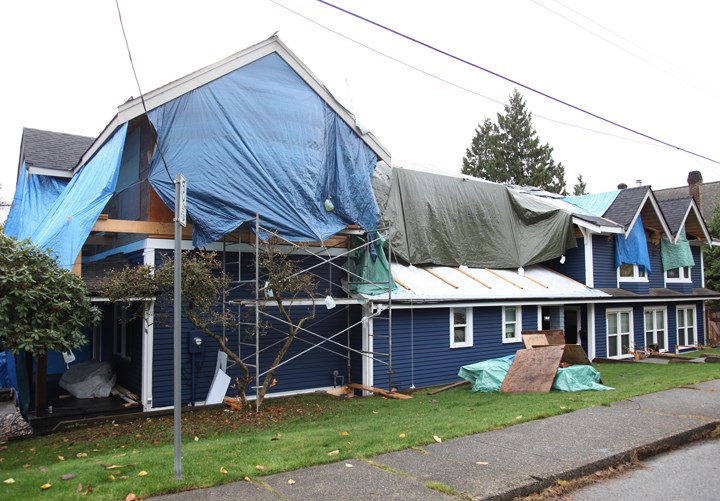New Westminster city council put two homeowners on the hot seat for failing to fulfill obligations of a heritage plan for their Queen's Park home.
In 2007, city council rezoned 218 Fourth St. to allow the owners to convert the existing three-car garage to a living space and build a small addition at the rear of that space. A restrictive covenant included architectural drawings that they were required to comply with during the renovations to the house that’s located on two legal lots.
The city issued a stop work order on the home in August, after a building inspector visited the site and noted major changes had been made to the plans for the site.
Beverly Grieve, the city’s director of development services, said all of the construction has been done in accordance with the building code. Some of the work, however, doesn’t comply with building permit plans or plans included with the restrictive covenant.
On Oct. 28, council held a public hearing to consider modifications to the covenant for the house at 218 Fourth St.
During the public hearing, the homeowners told council they made changes "along the way" because the building presented more challenges than had originally been anticipated. They noted that the covenant includes wording that suggests there's latitude to make changes as long as they’re generally in keeping with the approved plan.
Julie Schueck, the city’s heritage planner, said there’s a point where the homeowners went too far in making changes. She noted the house no longer has a turret and it has a different roofline, dormers and windows than originally proposed.
Schueck pointed out that the applicants have been "extremely cooperative" with staff and have rehired the architect who helped them with the original plan for the house, with the hope of fixing some of the mistakes made along the way.
If forced to take down the second-storey portion that doesn't comply with the covenant, the homeowners said the house would still be faced with the same problems they encountered during the initial construction process, such as water draining into the wall causing rot.
David Brett, president of the Queen's Park Residents' Association, said an email to the association members generated several responses, ranging from "opposed to very opposed" to the "very significant" changes made to the house. Although he doesn't want to make life difficult for neighbours, Brett said the work done was a "gross violation" of the original agreement.
Area resident Geoff Pomper said he spoke to the homeowners and understands their concerns about issues such as drainage.
"I have no problem with it," he said of the changes. "It looks great. I think it is going to add to the neighbourhood."
A Queen's Park resident also expressed concern about the fact work was allowed to proceed undetected for so long. He said covenants and heritage revitalization agreements are strict documents and the homeowners should have come to the planning department when making changes to the plan.
Following an hour-and-a-half public hearing, council voted against a staff resolution to approve modifications to the existing covenant and the substitution of plans for the residence that had been prepared by the architect.
Staff viewed the proposal as a "compromise" as it didn’t require the homeowners to take down construction but proposed changes that made it more in keeping with what had been originally proposed.
Coun. Chuck Puchmayr expressed concerns that some of the changes made were "blatant" changes designed to get extra benefits, such as increased floor space.
Coun. Lorrie Williams said she hopes a compromse can be reached that’s acceptable to the homeowners and the Queen’s Park Residents’ Association. She said she’s sympathetic to the homeowners’ plight and hopes a compromise can be found that isn’t so onerous that it financially cripples the homeowners.
Coun. Bill Harper said his concern is the “extent” to which the changes went beyond what was proposed in the original agreement. Coun. Jaimie McEvoy said the city needs to review how the system works so these sort of issued can be detected earlier.
Council defeated the recommendation, but directed the owners to work with staff and the community, so staff could report back to council as soon as possible.



